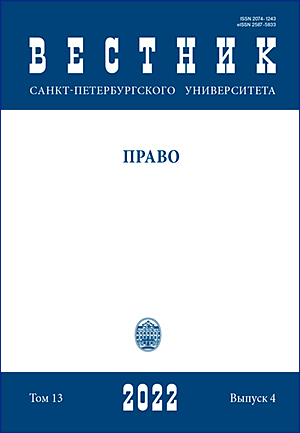The institutional framework of the European Union area of internal security
DOI:
https://doi.org/10.21638/spbu14.2022.409Abstract
The area of internal security is umbrella definition, which combine two European Union policies in the field of police cooperation and judicial cooperation in criminal matters. This article is aimed at solving a scientific problem related to the determination of the essential characteristics and legal nature of EU bodies and agencies that realize the EU policy on combating crime. The article studies the institutional framework of the EU area of internal security, analyzes specialized agencies designed to assist in the implementation of the EU competence in the field of police cooperation and judicial cooperation in criminal matters. The main purpose of the EU bodies and agencies within the area of internal security is to implement the Union’s competence in combating crime, this function is realized mainly through coordination of the activities of national law enforcement agencies. The creation of union bodies does not mean a decrease in the competence of the law enforcement agencies of the Member States. The authors conclude that EU bodies and agencies have a number of common features and essential characteristics that allow them to be distinguished as a relatively independent system. At the same time, the authors admit the possibility of qualifying these bodies as specific integration law enforcement agencies that have limited competence covering certain aspects of the fight against crime. According to the authors, the process of further development of the system of integration law enforcement bodies of the EU is currently underway, one of the features of this development is the strengthening of the supranational component. The study allows us to consider Europol, Eurojust, Cepol and the European Public Prosecutor’s Office not as separate bodies aimed on particular purposes, but as the elements of the special system and which develop according to the common rules.
Keywords:
European Union, area of internal security, cooperation in criminal matters, police cooperation, fighting against crime, law enforcement agencies
Downloads
References
Downloads
Published
How to Cite
Issue
Section
License
Articles of "Vestnik of Saint Petersburg University. Law" are open access distributed under the terms of the License Agreement with Saint Petersburg State University, which permits to the authors unrestricted distribution and self-archiving free of charge.






